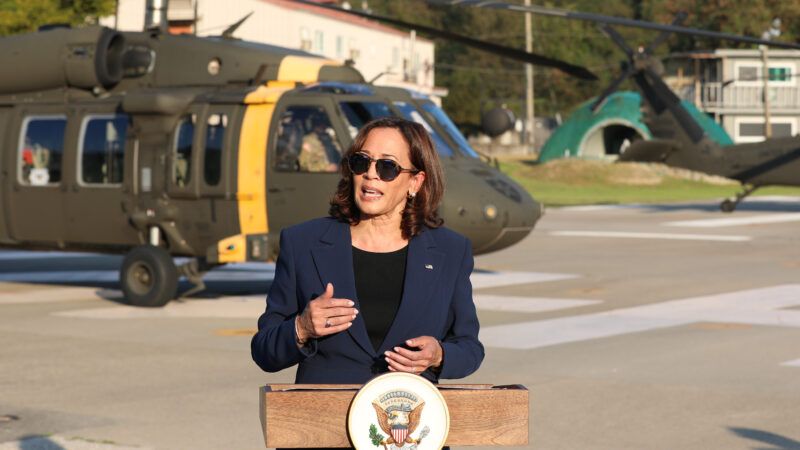Could Kamala Harris Be an Anti-War Candidate?
The answer is murkier than it may seem.

President Joe Biden wants to pass off the baton smoothly. After dropping out of the election, he endorsed Vice President Kamala Harris, calling her an "extraordinary partner" in his administration. And in many policy areas, a Harris administration would probably be equivalent to a second Biden term.
But foreign policy is the one area where the president's personal feelings matter the most, because he or she is unilaterally calling the shots. Biden himself has bucked the Democratic Party consensus many times, going out of his way to take a more hawkish line on Israel and more dovish line on Afghanistan than his colleagues.
Harris has been surrounded by very different influences than Biden, from her father Donald Harris, an unorthodox economist who scrutinized military Keynesianism, to her stepdaughter Ella Emhoff, who publicly raised money for Palestinian charities. Her national security adviser, Philip Gordon, is a former Obama administration official who became an outspoken dissident against the foreign policy consensus.
"The next time U.S. leaders propose intervening in the Middle East to change a hostile regime, it can safely be assumed that such an enterprise will be more costly, less successful, and more replete with unintended consequences than proponents of such action realize or admit," Gordon concluded in his 2020 book, Losing the Long Game: The False Promise of Regime Change in the Middle East. "So far at least, it has never been the other way around."
There are reasons for peace doves to be optimistic about Harris replacing Biden—although not too optimistic. Republican vice presidential candidate Sen. J.D. Vance (R–Ohio) has also been a harsh critic of regime change wars, yet at the Republican National Convention last week, he called for bombing Iran. Whether Harris presents herself as a fresh start from Biden's war hawkery, or whether she attempts to out-hawk her Republican rivals, remains to be seen.
As vice president, of course, Harris has taken the same line as her boss. At the Munich Security Conference in February, she vowed to keep arming Ukraine against Russia "as long as it takes" and "make sure Russia pays damages to Ukraine." And at the Association of Southeast Asian Nations conference last year, she accused China of "bullying" its neighbors, while denying that the United States itself is "seeking conflict."
Biden and Harris differ the most on the Middle East. Harris has publicly criticized Israel's treatment of Palestinians, and reportedly pushed Biden in private to be "more forceful at seeking a long-term peace." An adviser told The Nation that the differences between Biden and Harris on the issue are "not in substance but probably in tone."
The best clue to the philosophy driving the Harris team's approach to the Middle East is Losing the Long Game. Reflecting on his own experiences in the White House, and warning that then-President Donald Trump was repeating the same mistakes in his attempts to overthrow the Iranian government, Gordon wrote that the record "shows no case of clear success, some catastrophic failures, and universally high costs and unintended consequences" for regime change efforts.
Gordon has an almost-libertarian criticism of the foreign policy establishment: "The bias of American political culture, resulting from the country's record of achievement and belief in its own exceptionalism, is to believe every problem has a solution, and the bias of the U.S. government is to act forcefully to try to solve those problems, no matter how difficult they might appear."
But Gordon also took care to separate himself from people who have "a principled opposition to the use of military force" or believe that "the United States has little at stake in the Middle East." Instead, he prefers a combination of "engagement, diplomacy, and containment," along with "selective military actions."
That leaves a lot of room for the "light footprint" operations and proxy wars that Biden pursued—and that ultimately allowed for the post-October 2023 explosion in the Middle East. Gordon himself warns that regime change critics can turn into regime changers, if they're convinced that they're more clever than their predecessors.
"Books and articles are written by key protagonists, explaining that victory could have been achieved if only U.S. leaders had been wiser, more determined, and willing to commit adequate resources to the task," Gordon writes. "Over time, the American public sours on the results of the intervention and…the policy is shelved, usually after a new president enters office and blames the problem on the ill-conceived or poorly implemented strategy of his predecessor. This rejection of the policy then lasts until the next time leaders consider trying it again—sometimes in the very same country where it failed the first time."
Gordon's view of history points the way to the opportunities, and the dangers, of his boss's candidacy.


Show Comments (53)